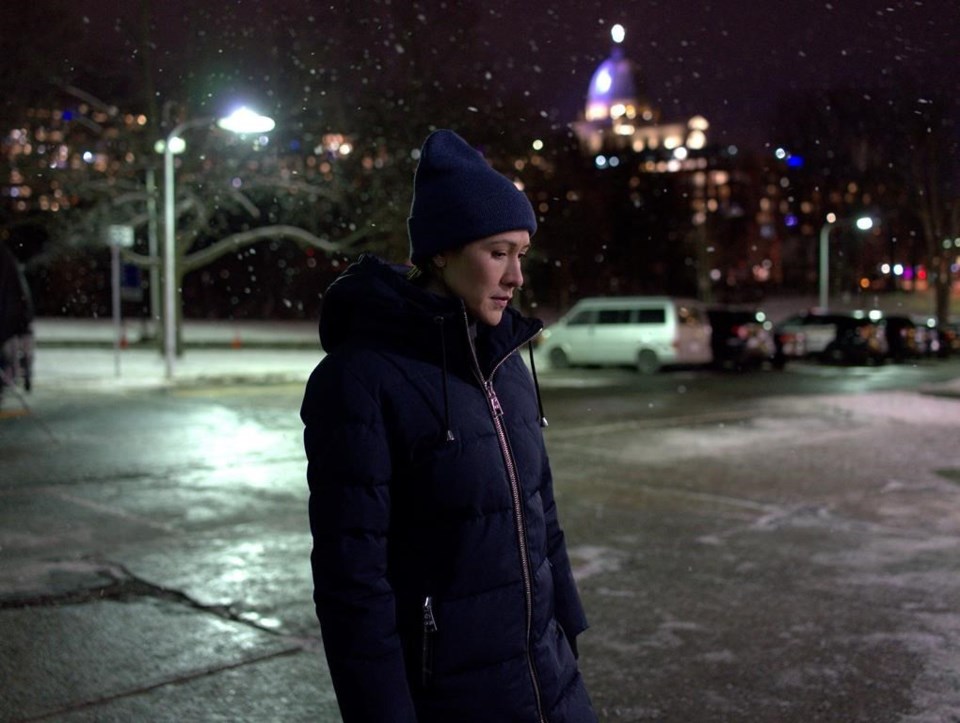TORONTO — Prime Video’s book-to-screen adaptation of Louise Penny’s beloved Quebec-set detective novels does more than just update the source material, it spotlights Indigenous stories in a whole new way, says co-star Elle-Máijá Tailfeathers.
Tailfeathers, who is a member of the Kainai First Nation, says the eight-part drama "Three Pines" deepens and updates the whodunit tales by expanding Indigenous threads in the text, most notably by making her character Sgt. Isabelle Lacoste an Indigenous woman, instead of white.
Instead of investigating the case of a missing nine-year-old boy as in the 11th book, the streaming version of lead character Chief Insp. Armand Gamache is faced with a series of murders that intersect with police failure to examine the town's history of missing and murdered Indigenous women.
"Three Pines" also adds several Indigenous characters, including a calm-spirited gallery owner played by Tantoo Cardinal and the relatives of a missing woman, whose resilient family is played by Georgina Lightning, Anna Lambe and Crystle Lightning.
Tailfeathers says the show was intent on crafting nuanced Indigenous storylines that go beyond superficial trauma narratives by weaving in evocative domestic details: a mother's loving hug for her child, a family's humorous bickering at the dinner table.
“That’s what I think is different about ‘Three Pines,’ in particular, it’s that we get to see strength, hope, resilience, and love — a diversity of lived experience on screen when it comes to our Indigenous characters,” Tailfeathers says in a recent phone interview from Toronto.
Tailfeathers says she mainly agreed to the role because she knew that award-winning Indigenous director Tracey Deer, from the Mohawk community of Kahnawake, would direct a pivotal two-part episode.
As in the bestselling books, “Three Pines" centres on Chief Insp. Gamache of the Sûreté du Québec as he investigates mysterious murders in the quaint fictional town of Three Pines, itself a character in the books, which have also touched on other social issues including COVID-19 and the opioid crisis.
British stage and screen star Alfred Molina, best known for his work in the "Spider-Man" film franchise as the tentacled terror Doc Ock, stars as the vulnerable optimist Gamache, who takes the time to ruminate on grief with each victim he comes across. Canadian actors Rossif Sutherland and Sarah Booth play sergeants.
Although Gamache is francophone in the books, he studied at Oxford and is described as having a slight English accent. Still, devotees of the source material will note there is no French dialogue in the onscreen version and that Molina retains his British inflections.
Molina says he joined the project after discovering how rich in detail Penny’s source material was, and says he relished playing a character who considered history a necessary tool to solve murders.
“This kind of stuff is gold dust to actors,” Molina says by phone from Toronto during a recent press tour.
“It’s what makes playing these characters so delicious, so the character we first meet evolves with everything.”
Molina himself says he felt humbled witnessing Deer direct some of the more difficult moments of the series that deal directly with the topic of residential schools. He says she spoke to actors individually about what some of the more harrowing scenes meant to Indigenous Peoples, and how they should be respected.
“She knew it was going to be tough, not just for the crew, and everyone, but also for all the Indigenous actors who were working there,” said Molina.
“As non-Indigenous people, we relied on their experience and knowledge, and it made all the difference."
Though the adaptation largely stays true to Penny’s original source material, Molina says the series went the extra mile to showcase Indigenous points of view.
He says Indigenous characters were given lengthy bits of screen time to express grief or challenge the systems that were presumed to protect them.
“I was talking to someone recently about how very often the responsibility of representation often falls on the shoulders of one character — they have to somehow embody all the hardships, all the experience and all the history,” says Molina.
“Whereas, what we’ve done here is that we’ve got many Indigenous characters.”
Tailfeathers says a good deal of work and conversation took place before and during production and that Indigenous consultants were on-set during the shoot.
She adds that playing Sgt. Isabelle Lacoste forced her to come to grips with her own perspective on law enforcement and its painful history with Indigenous Peoples.
“I’ve had some really scarring experiences with police, and that’s a challenging thing to navigate as an Indigenous person with that specific lived experience,” says Tailfeathers, also an activist and filmmaker.
“Knowing that policing as a whole can, and has been, historically, incredibly, so violent for Indigenous people — to a play a cop on screen was challenging.”
Tailfeathers says she’s rarely been involved in mainstream projects that do justice to Indigenous experiences. That's why she says she's chosen to largely work with Indigenous directors in her later career.
“It's probably been 17 years since I started as an actor, and there was quite a while when I just quit acting because I was so jaded and frustrated with the industry and the types of stories being told,” she says.
“I was doing a disservice to my people, to myself as an Indigenous person by participating in stories that were simply just replicating inauthentic representations of our people onscreen, which can be so harmful in so many ways.”
Tailfeathers says Indigenous Peoples must be involved in the way they are presented on screen and the way their stories are told.
“Times are changing, and it has to do with the advocacy, activism and demanding that Indigenous people are actually included in telling our own stories on screen, and that in fact, we are leading the conversation.”
The first two episodes of "Three Pines" hit Prime Video on Friday.
This report by The Canadian Press was first published Nov. 29, 2022.
Noel Ransome, The Canadian Press



